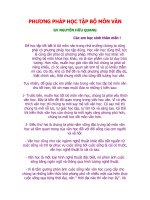BÀI GIẢNG MÔN CÚ PHÁP
Bạn đang xem bản rút gọn của tài liệu. Xem và tải ngay bản đầy đủ của tài liệu tại đây (638.42 KB, 57 trang )
Page 1 of 57
UNIT 1
TYPES OF RELATIONSHIPS (BETWEEN IMMEDIATE CONSTITUENTS)
QUAN HỆ GIỮA CÁC THÀNH TỐ TRỰC TIẾP TRONG CÂU
I. Hypotactic Relationship: Mối quan hệ trong câu.
1. Exocentric: Mối quan hệ tương đương, hỗ tương
→ to indicate the tenses
to-infinitive
conjunction “and”
Subject-Predicate
Ex 1: He runs.
Ex 2: He is leaving tomorrow.
Ex 3: We have been living here for 5 years.
Ex 4: I want to study
Ex 5: I like football and volleyball
2. Endocentric: Mối quan hệ phụ thuộc
→ to indicate the types of modifiers (to modify N, V, Adj, Adv)
Page 2 of 57
Ex 1: The girl sings very well.
Ex2: The more, the better.
Ex 3: The fence between the houses.
Ex 4: The childrens swing in the park.
Test: There are 5 IC relationships in the diagram. T/ F T
Test: There are 5 IC relationships in the diagram which are exocentric. T/ F F
Test: There are 5 IC relationships in the diagram which are endocentric T/ F T
Ex 5: The boy runs very quickly.
Test: There are 3 IC relationships with 2 endocentric and 1 exocentric. T/ F F
II. Paratactic relationship: Moỏi quan heọ ngoaứi caõu.
1. Well, it is all right. 2. Oh, I like it
Page 3 of 57
3. John, do it !
4. Wow, he has passed the exam.
5. I think that that that that that man used is wrong.
sentence 5: Tôi cho rằng cái chữ that ấy mà anh chàng đấy sử dụng thì chữ that
ấy sai rồi.
III. I.C Relationships in different types of simple sentences:
(Mối quan hệ trực tiếp giữa các thành tố trong câu đơn)
1. Statements
2. Interrogative (Questions)
3. Imperative (Commands)
4. Exclamative (Exclamations)
1.1: Statements: Affirmative
Negative
Page 4 of 57
I can do it. I can not do it.
You should go home.
Running the show is no fun.
The boy was badly bitten by a dog.
2.1: Interrogative.
a. Yes-No questions
b. WH-questions
c. Tag questions
a. Yes – No Questions
Are you hungry ?
Page 5 of 57
Are you going to the cinema ?
b. WH-questions
What is it ? = It is What
What are you doing ? What do you love ?
Where did he go ?
c. Tag questions
The weather is not hot, is it ?
He has worked hard, hasn’t he ?
Page 6 of 57
3. Imperative: Affirmative
Negative
Come here ! Do not tell him !
Stop!
Stop doing that ! Don’t be angry with me ! Quickly!
4. Exclamative: a) How + adj/adv + Clause !
b) What + a + NP
How beautiful she is ! What a beautiful girl she is !
//
Page 7 of 57
UNIT 2
WORD CLASSES
I. Definition: Word classes = parts of speech
II. Classification:
1. Major (= open): nouns, verbs, adjectives, adverbs.
2. Minor (= closed): Pronouns, numerals, determiners, prepositions,
conjunctions.
1.1: Nouns:
1.1.1: Proper noun: (Mr. Smith, Vietnam, Kodak…)
1.1.2: Common noun: (Man, city, building, dog, cat, …)
1.1.3: Concrete noun: (Box, hat, desk, book, pen, computer,…)
1.1.4: Abstract noun: (Beauty, love, courage, friendship, childhood…)
1.1.5: Collective noun: (Crowd, team, class, family, committee,
organization, council, …)
1.2: Verbs:
1.2.1: Be/linking verbs:
Ex: The boy is a student.
The sky becomes cloudy.
1.2.2: Transitive verbs: requiring an object as part of predicate.
Ex: The children ate the fried chicken on the table.
The girl learns English.
1.2.3: Intransitive verbs: No object is required.
Ex: They go in the morning.
The students come late.
//
Page 8 of 57
Jack
gave
a
rose
to
Jane
.
UNIT 3
MAJOR CLASS (OPEN CLASS)
I. Nouns:
a. Proper nouns: Refer to people’s names, places, countries, cities…
b. Common nouns: Consist of Concrete nouns & Abstract nouns.
II. Verbs:
a. Auxiliary verbs: to produce grammatical meanings (be, do, have,
modal verbs).
b. Lexical verbs: to produce lexical meanings.
b.1: Transitive verbs:
Transitive verb + Object → To satisfy the questions: Whom/What?
b.2: Intransitive verbs:
Intransitive verb + Þ → To satisfy the questions :
How/When/Where/Why? → adv
c. Di-Transitive verbs: → To produce 2 Objects
Ex: give, send, offer, show, …
D.O: direct object.
I.O : indirect object.
Jack
gave
Jane
a
rose
Page 9 of 57
III. Adjectives.
a. Gradable adjective: that can be graded Phaõn caỏp ủửụùc (hot, tired,
interesting, expensive, )
b. Non-gradable adjective. that cant be graded Khoõng theồ phaõn caỏp
(previous, materialistic, physical, alive, dead, wooden, .)
Order of Adjectives:
Quality
(Opinion)
Size
Age
Shape
Color
Nationality
Origin
Material
Purpose
(Gerund)
Noun
mod
N
Head
Good,
bad, nice
Big,
small
Old,
new
Square,
oval
Blue,
black
Vietnamese
Chinese
Metal,
wood
Dining,
living
carpet
OSASCOMP
IV. Adverbs.
a. Adverb of time: now, tomorrow, yesterday,
b. Adverb of place: here, there, over there, upstairs
c. Adverb of manner: nicely, carefully How?
d. Adverb of degree: very, extremely, terribly, quite
e. Adverb of frequency: How often?
e.1: usually, always, often, rather, frequently, sometimes, seldom, rarely,
hardly ever, never, normally.
e.2: every day, every weekend, every morning, every year, several times, every
three hours,
//
Page 10 of 57
UNIT 4
MINOR CLASS (CLOSED CLASS)
I. Pronouns:
1. Personal pronouns:
a. Subject pronoun.
b. Object pronoun.
2. Possessive pronouns.
3. Reflexive pronouns.
4. Interrogative pronouns.
5. Relative pronouns.
6. Demonstrative pronouns.
7. Indefinite pronouns.
Interrogative pronouns: who, whom, which, what, whatever, why, where,
wherever, when, whenever, how, how, whose, whether,
Relative pronouns: who, whom, which, that.
Demonstrative pronouns: this, that, these, those.
Indefinite pronouns: no-one, nobody, nothing, everyone, everybody,
everything, anyone, anybody, anything, someone, somebody, something
Test: A. Whose knife is it ?
B. It’s nobody (1)
It’s nobody’s Þ (2)
I talk to myself.
Jack himself wrote the letter.
The cat
licked
it
self
.
I like the film itself.
I like the lyrics themselves.
Page 11 of 57
Protecting the environment is everyone’s responsibility
Inter.pro
Who are you?
Inter.pro
I don’t know who you are
Rel.pro
The person who loves me most is my mother
II. Numerals: Nhóm số từ.
1. Ordinal numbers : The first, the second, …
2. Cardinal numbers: Lesson 5, lesson 6, …
Test: the lesson 2 / the second lesson → whether both are correct ?
Either is ok ? → wr
III. Determiners: Từ hạn đònh. → to modify = to function as a modifier
1. Identifiers – từ xác đònh
1.1: Article:
Indefinite article: a, an.
Definite article: the
1.2: Possessive adjective: my, your, her, his, its, our, their.
1.3: Demonstrative adjective: this, that, these, those.
2. Quantifiers – từ đònh lượng: much, many, a few, few, a little, little, several,
some, any, a lot of, most, most of, half, a great deal of, ….
Page 12 of 57
NOTE:
Ex: Demonstrative pronoun → This sounds great.
Demonstrative adjective → This novel sounds great.
IV. Prepositions:
1.N
2.V Prepositions N (N equivalents = gerund/ pronoun).
3.Adj
single adj, ed- adj, ing-adj
Practice of Prep.
Ex 1: The seminar on the pollution
Ex 2: I am talking about eating fast food.
Ex 3: My mother is good at cooking. I am keen on eating KFC.
Page 13 of 57
V. Conjunctions:
1. Co-ordinating conjunctions: Liên từ đẳng lập – and, but, or, so …. - giới
thiệu thành phần đẳng lập → to produce compound Sentences
2. Subordinating conjunctions: Liên từ phụ thuộc – giới thiệu thành phần phụ,
→ to produce complex Sentences
2.1: Noun clause.
2.2: Adjective clause.
2.3: Adverb clause.
Ex 12/ page 11/ analyzing English
Exercises:
Make up a sentence in which minor classes can be found and draw a diagram of I.C
relationship.
1. You should choose this book.
2. I and my friends play football every weekend.
3. Put your hand on your head.
4. I have studied English for seven years.
Page 14 of 57
5. He usually goes to work by motorbike
//
UNIT 5
PHRASES
Kinds of phrases: There are 10 kinds of phrases.
1. Noun phrase (NP).
2. Verb phrase (VP).
3. Adjective phrase (Adj.P).
4. Adverb phrase (Adv.P).
5. Preposition phrase (Prep.P).
6. Infinitive phrase (Inf. P)
7. Gerund phrase. (Ger.P)
8. Present participle phrase. (Present PP)
9. Past participle phrase. (Past PP)
10. Appositive phrase. (Appo) → to refer to Subj and Obj
1. Noun phrases.
1. Definition:
Pre-Modification + Noun (Head) + Post-Modification.
Optional Obligatory Optional
Page 15 of 57
Ex: our two first beautiful girls with blue eyes.
Pre- modifiers (Noun-head) Post-modifiers
2. Pre-Modification:
The new project manager
Noun-mod Noun-head
- Identifiers (article, demonstrative adj, possessive adj )
- Numerals (cardinal, ordinal)
- Quantifiers
- Adj (9 orders)
- N- modifiers
3. Post-Modification:
3.1: Prepositional phrases (prep.p)
The mother’s love for the children is great.
Art N-Mod N-head Prep.p
Pre-Mod Post-Mod
NP
3.2: Infinitive phrase: (Inf.p)
(NP)
His risky decision to invest in the business sounds impossible.
Poss-adj Adj N-head Inf-phrase
Pre-Mod Post-Mod
Page 16 of 57
(NP)
Her ambition to become a chairman sounds strange.
Pre-Mod N.head Inf-p/ Post-Mod
Practice:
Her dream to study abroad is great
His plan to finish the project is workable.
Our wish to win the game is impossible
Note: Finite verbs & non-finite verbs.
- Finite verbs: → conjugated verbs to agree with the subject in terms of person and
number
- Non-finite verbs: Inf-P
Present PP, Past PP
Ger.P
3.3: Present participle phrase: (Present PP)
( Noun phrase)
I like the girl looking at the garden.
S V Present PP
Pre-Mod N-head Post-Mod
3.4: Past participle phrase: (Past PP)
(Noun phrase)
The boy punished badly by his father cried loudly.
Past PP
Pre-Mod N-head Post-Mod
Page 17 of 57
Note: there are 3 kinds of noun phrases.
1. Noun phrase with Pre-Mod.
2. Noun phrase with Post-Mod.
3. Noun phrase with both Pre-Mod and Post-Mod.
//
UNIT 6
VERB PHRASES
I. Definition:
Aux.V Lex.V
Aux + V Ex: She is crying loudly.
Head
Lexical verb
II. Kinds of Verb phrases.
1. Finite verb phrases → tenses.
She has been working in the office for five years.
2. Non-finite verb phrases.
2.1. Gerund phrases. Going to school is fun.
2.2. Infinitive phrases. To love someone is to forgive his/her mistakes.
2.3. Participle phrases. I like the girl talking to you /
The boy punished by his mother cried bitterly.
3. Variations of verb phrases.
3.1. Verb and Verb.
Ex:
Come and see the doctor
She sat and sang.
Page 18 of 57
She sat by the door and sang softly.
Optional Optional
3.2 Verb + Adv
Ex: The children moved around
He ran down.
V.P
3.3. Verb + Object
Ex: They admire the sunshine.
I like the interesting book.
V.P
3.4. Verb + Prep.p
Ex: I look for a better job.
We rely on our parents.
//
UNIT 7
ADJECTIVE PHRASES
I. Definition.
Pre – Mod + Adjective + Post - Mod
Head
Optional Obligatory Optional
Page 24
Page 19 of 57
II. Kinds of Adjective phrases.
1) Adj P with Pre-Mod.
2) Adj P with Post-Mod.
3) Adj P with both Pre-Mod and Post-Mod.
so, too, extremely
very hot
Pre-Mod Adj-Head
Adj.p
Ex1: The wallet is too much expensive.
Pre-Mod Adj-Head
Ex2: The room is good enough.
Adj-Head Adv of degree
Post-Mod
Ex3: The coffee is too strong to drink.
Adv Adj-Head Infinitive
Pre-Mod Post- Mod
III. Modification of Adjective phrases.
1. Pre-Mod: Adverb of degree = Intensifiers.
Page 20 of 57
2. Post-Mod: Complement
Infinitive
That-clause (N-Clause)
Prep phrases
Ex1: too strong to drink.
Adj-Head Inf
Post-mod
Adj.P
Ex2: I am happy that you could join us.
Adj-Head that - clause
Post -Mod
Ex3: I am happy about that project outcome.
Adj-Head Prep-Phrase
Post- Mod
Adj-P
IV. Functions of Adjective Phrase.
1. Attributive (bổ ngữ) – before noun.
2. Predicative (vị ngữ) – after “to be” and “linking verbs”.
Adj P
Ex1: Jane is an extremely attractive girl.
Pre-mod adj-Head Noun
Adj.P + Noun- Head = NP
Page 21 of 57
an extremely attractive girl.
Be
Linking Verb + Adj.phrase
→ (Predicative)
The boy is/ looks fairly handsome.
Adj.P
Predicative
//
UNIT 8
PHRASES (Cont.)
4. Adv. phrase
→ Pre.Mod :
He was too much excited
→ Post-Mod (Inf P, Adv.Cl ) :
He ran too quickly to catch up with.
He ran so quickly that we couldn’t catch up with him.
Page 22 of 57
Functions: to modify Verb,
Adj,
a sentence
- She sang especially gorgeously.
- He treated the matter extremely seriously.
- I don’t think he can run that far.
- He completed the test exceptionally well.
- More importantly, a smile may cost nothing.
- Quite honestly, it is not easy to win the contract
- Much surprisingly, he didn’t arrive.
5. Prep phrase → functions: adv (of place, of time, of manner)
Post -Modifiers (in a NP)
He walked in the garden in the evening.
adv of place adv of time
He carried it with care.
adv of manner
I like the girl with blue eyes.
Page 23 of 57
6. Inf. Phrase → functions S
O
Sc
Post-Mod
Adv (of purpose)
- It is difficult to apply for a good job.
S
- To love someone truly is to forgive the person’s mistakes.
S Sc
- His ambition to become a billionaire sounds crazy.
Post -mod
- I want to enrich my knowledge.
O (What ?)
- I go to school to enrich my knowledge.
Adv (of purpose) (Why?)
Page 24 of 57
7. Gerund Phrase → functions S
O
Sc
- Jogging every morning improves his health.
S
- His running down the hall in the dorm disturbed us
S
- They enjoy living in the peaceful countryside.
O
- The new students were nervous about living in the dormitory.
O
- The president is capable of handling the situation.
O
- My hobby is reading short stories.
Sc
- His routine seems walking in the park early in the morning.
Sc
8. Present part Phrase → functions adj (post-mod)
adv
- The man talking to Jack is his boss
Adj- post-mod
Page 25 of 57
- Talking to Jack, the man got angry.
adv
9. Past part Phrase → functions adj (post-mod)
adv
- The chair broken in two halves will be fixed tomorrow.
- Broken into two halves, the chair can’t be used.
adv
10. Appositive Phrase → functions: post-mod
refer to S
refer to O
Ex:
Jack, my best friend, will join my party.
S
Jack loves Jane, a fifteen-year-old girl.
O
Test: If Jack is omitted, my best friend will replace its function.
If Jane is omitted, a fifteen-year-old girl will replace its function.
//









